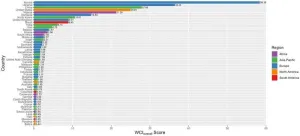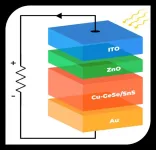(Press-News.org) Organisations that fail to identify or swiftly expel “institutional parasites” risk long-term damage, academics from leading British and Finnish business schools have warned.
In a paper published in the respected Academy of Management Review, they argue that the increasingly complex and opaque nature of many organisations provides fertile ground for institutional parasites – such as suppliers or other key external partners and employees.
Dr Jukka Rintamäki from Finland’s Aalto University School of Business, Dr Simon Parker from Nottingham University Business School and Professor Andre Spicer, Professor of Organisational Behaviour at Bayes Business School (formerly Cass), City, University of London analysed existing research and a range of case studies.
They cite accountancy firms which collude in falsification of accounts (such as Arthur Andersen’s oversight of collapsed energy giant Enron) and specialist ESG firms that guarantee positive outcomes from human rights and sustainability audits of clients’ supply chains.
The authors used a model developed by Dr Rintamaki to explore how the parasites form and proliferate – and how they can be challenged effectively.
The parasitical action can initially benefit both the institutional parasite and the host organisation, they conclude. The parasite is more likely to win contracts by guaranteeing positive conclusions, while the latter may pay less tax or have lower supply chain costs.
The more complex and opaque the institutional environment, the more parasites can remain undetected or without their negative impact being obvious, the paper says.
Dr Rintamäki said: “Institutions identify and act against obvious threats but it is the insidious ones that can fell them. A leech that is visibly draining blood from a body will be quickly removed. An internal parasite, such as a roundworm, can cause significant harm to the host human before they realise they have a problem and seek medical attention and treatment.”
Partly due to the initially mutually beneficial nature of much parasitical activity, leaders can engage in a wilful blindness – or fail to clearly identify and challenge the parasites. That can foster more parasites – and ultimately lead to significant harm, including the collapse of the organisation.
Even when seeking to manage or remove the parasitical activity, leaders can actually exacerbate the problem, the authors warn.
Some leaders or industry watchdogs or legislators react with new policies, rules and guidance. Ironically, such measures can nurture the very environment in which parasites thrive by increasing complexity and opacity. The organisation is also focussing on process and administrative actions rather than its core functions – risking inefficiencies and reputational damage.
The authors urge leaders to instead act boldly – “reforming” the institution in ways that improve transparency and reinforce its core purpose and principles. Regulators and lawmakers responding to exposure of wrongdoing should also embrace that approach and aim to improve the identification of parasitical actors.
Often an organisation that has drifted too far from the principles and practices that made it successful in the first place needs to change to maintain or regain success, Dr Parker said.
“Complexity is the key driver of institutional parasitism and as organisations grow it is more difficult for leaders to be aware of emerging problems across many sites or partner organisations. It’s also a fact of life that there is sometimes a gap between what we claim about ourselves and what we do – and that can apply, for example, to monitoring of suppliers.”
Professor Spicer said: “In modern life medical science and public health regulations have removed many parasites and other risks to our biological health from our daily lives. Simultaneously, however, our increasingly complex working environments have fostered the conditions where institutional parasites flourish.
“We have all worked with ‘slackers’ and with people who sometimes cut corners or sail close to the wind ethically. Our concept of institutional parasites goes well beyond that.”
Dr Parker said: “It’s understandable that the first response to a parasitical threat is adding yet more pages to bulging staff manuals or supplier contracts. However, leaders should instead focus on stripping back the complexity and looking at the core functions, purpose and expectations of their organisation. Ironically, sometimes such change allows leaders to maintain a form of the status quo.”
END
Organizations need to beware whispering death from “institutional parasites”, study finds
Insidious or apparently benign mavericks can ultimately destroy an organisation from within and without
2024-04-10
ELSE PRESS RELEASES FROM THIS DATE:
New book helps citizen scientists navigate complexities of infectious disease outbreaks
2024-04-10
WASHINGTON (April 10, 2024) — Citizen scientists have long contributed to the collection and observation of natural events - from weather watchers to wildlife trackers – with thousands of organized community projects spanning decades. Beginning in 2020, the COVID-19 pandemic gave rise to an explosion of novice infectious disease detectives adding to the collection of science-enthusiasts.
To give these new disease detectives more tools for their craft, a new book written by two Georgetown University global health researchers, “Outbreak ...
UT Extension specialist chosen to help support national immunization program
2024-04-10
A University of Tennessee Extension specialist has been selected to assist land-grant university teams implementing grants through the Extension Collaboration on Immunization Teaching and Engagement (EXCITE), a national effort to encourage adult vaccinations in rural areas and among underserved communities.
Laura Clark, UT Extension state specialist in family and consumer sciences, will serve as a national EXCITE Bridge Grant coach and work with six land-grant universities that are grant recipients through the program. Clark has worked for UT Extension for six years, ...
Economic wealth may be linked with happiness in China – if inequality is low
2024-04-10
A country’s economic prosperity is linked with improved well-being in its residents, according to a study published April 10, 2024 in the open-access journal PLOS ONE by Feng Huang from the Chinese Academy of Sciences, and colleagues.
Philosophers have long pondered the fraught relationship between money and happiness. Aristotle and Solon argued against the euphoric powers of wealth, while the Easterlin Paradox suggests that a nation’s economic fortitude can influence its residents’ health and happiness. Little evidence exists to support this claim in China, especially after the country’s recent economic expansion and rapid industrialization.
Huang and colleagues ...
Most cybercriminal threats are concentrated in just a few countries
2024-04-10
A newly developed World Cybercrime Index shows that most cybercriminal threats are concentrated in several countries, with different countries associated with distinct cybercrime types. Miranda Bruce (University of Oxford/University of New South Wales), Jonathan Lusthaus (University of Oxford), Ridhi Kashyap (University of Oxford), Nigel Phair (Monash University), and Federico Varese (Sciences Po) present these findings in the open-access journal PLOS ONE on April 10, 2024.
Worldwide, cybercrimes are estimated to cost hundreds ...
US building footprints could help identify neighborhood sociodemographic traits
2024-04-10
An analysis of building footprints in major US metropolitan areas identifies five different neighborhood types that vary in footprint size, shape, and placement, and which are statistically associated with varying neighborhood socioeconomic and demographic traits. Noah Durst of Michigan State University, US, and colleagues present these findings in the open-access journal PLOS ONE on April 10, 2024.
People have long studied the shape and placement of human settlements—“neighborhood morphology”—to help inform urban planning and management. Recent technological advancements, such as high-resolution satellite imagery and more powerful computational ...
Indigenous Australian message sticks, which feature markings to convey messages over long distances, analyzed for first time at scale through new database of 1,500 artifacts
2024-04-10
Indigenous Australian message sticks, which feature markings to convey messages over long distances, analyzed for first time at scale through new database of 1,500 artifacts
###
Article URL: https://journals.plos.org/plosone/article?id=10.1371/journal.pone.0299712
Article Title: AMSD: The Australian Message Stick Database
Author Countries: Australia, Germany
Funding: The lead author (Piers Kelly) receives salary and project funding specifically for the research described in this paper. He is funded by an ARC Discovery Early Career Researcher ...
Mixed diets balance nutrition and carbon footprint
2024-04-10
What we eat can impact our health as well as the environment. Many studies have looked at the impacts of diets in very general terms focused at the level of food groups. A new study led by researchers at the University of Tokyo explores this issue following a more nuanced dish-level approach. One of the benefits of this kind of study is that people’s connections with their diets vary around the world and have strong cultural associations. Knowledge of the impacts of diets using dishes rather than broad food groups can help individuals make informed choices and those in the food industry improve ...
New quantum material promises over 190% quantum efficiency in solar cells
2024-04-10
Researchers from Lehigh University have developed a material that demonstrates the potential for drastically increasing the efficiency of solar panels.
A prototype using the material as the active layer in a solar cell exhibits an average photovoltaic absorption of 80%, a high generation rate of photoexcited carriers, and an external quantum efficiency (EQE) up to an unprecedented 190%—a measure that far exceeds the theoretical Shockley-Queisser efficiency limit for silicon-based materials and pushes the field of quantum materials for photovoltaics to ...
AI powered “digital twin” models the infant microbiome
2024-04-10
The gut microbiome has a profound impact on the health and development of infants. Research shows that dysbiosis—or imbalances in the microbial community—is associated with gastrointestinal diseases and neurodevelopmental deficits. Understanding how gut bacteria interact, and how these interactions may lead to some of these problems, however, is difficult and time consuming through traditional laboratory experiments.
Researchers at the University of Chicago have developed a new generative artificial intelligence (AI) tool that models the infant microbiome. This “digital ...
World-first “Cybercrime Index” ranks countries by cybercrime threat level
2024-04-10
Following three years of intensive research, an international team of researchers have compiled the first ever ‘World Cybercrime Index’, which identifies the globe’s key cybercrime hotspots by ranking the most significant sources of cybercrime at a national level.
The Index, published today in the journal PLOS ONE, shows that a relatively small number of countries house the greatest cybercriminal threat. Russia tops the list, followed by Ukraine, China, the USA, Nigeria, and Romania. The UK comes in at number eight.
Co-author of the study, Dr Miranda Bruce from the ...
LAST 30 PRESS RELEASES:
Scientists show how to predict world’s deadly scorpion hotspots
ASU researchers to lead AAAS panel on water insecurity in the United States
ASU professor Anne Stone to present at AAAS Conference in Phoenix on ancient origins of modern disease
Proposals for exploring viruses and skin as the next experimental quantum frontiers share US$30,000 science award
ASU researchers showcase scalable tech solutions for older adults living alone with cognitive decline at AAAS 2026
Scientists identify smooth regional trends in fruit fly survival strategies
Antipathy toward snakes? Your parents likely talked you into that at an early age
Sylvester Cancer Tip Sheet for Feb. 2026
Online exposure to medical misinformation concentrated among older adults
Telehealth improves access to genetic services for adult survivors of childhood cancers
Outdated mortality benchmarks risk missing early signs of famine and delay recognizing mass starvation
Newly discovered bacterium converts carbon dioxide into chemicals using electricity
Flipping and reversing mini-proteins could improve disease treatment
Scientists reveal major hidden source of atmospheric nitrogen pollution in fragile lake basin
Biochar emerges as a powerful tool for soil carbon neutrality and climate mitigation
Tiny cell messengers show big promise for safer protein and gene delivery
AMS releases statement regarding the decision to rescind EPA’s 2009 Endangerment Finding
Parents’ alcohol and drug use influences their children’s consumption, research shows
Modular assembly of chiral nitrogen-bridged rings achieved by palladium-catalyzed diastereoselective and enantioselective cascade cyclization reactions
Promoting civic engagement
AMS Science Preview: Hurricane slowdown, school snow days
Deforestation in the Amazon raises the surface temperature by 3 °C during the dry season
Model more accurately maps the impact of frost on corn crops
How did humans develop sharp vision? Lab-grown retinas show likely answer
Sour grapes? Taste, experience of sour foods depends on individual consumer
At AAAS, professor Krystal Tsosie argues the future of science must be Indigenous-led
From the lab to the living room: Decoding Parkinson’s patients movements in the real world
Research advances in porous materials, as highlighted in the 2025 Nobel Prize in Chemistry
Sally C. Morton, executive vice president of ASU Knowledge Enterprise, presents a bold and practical framework for moving research from discovery to real-world impact
Biochemical parameters in patients with diabetic nephropathy versus individuals with diabetes alone, non-diabetic nephropathy, and healthy controls
[Press-News.org] Organizations need to beware whispering death from “institutional parasites”, study findsInsidious or apparently benign mavericks can ultimately destroy an organisation from within and without






